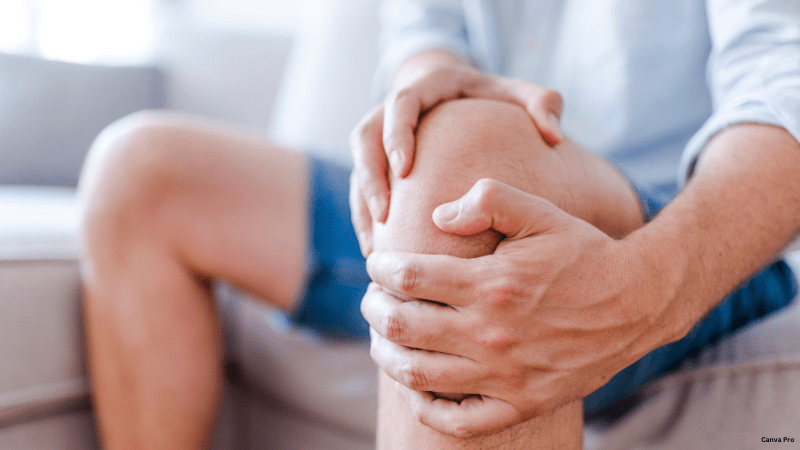Arthritis: Comprehensive Strategies for Managing Arthritis Pain
Navigating Arthritis Pain: Strategies for Understanding, Lifestyle Adjustments, Exercise, Medications, and Therapies
Arthritis is a leading cause of pain and disability worldwide, affecting millions of people. Managing arthritis pain effectively requires a multifaceted approach that includes understanding your condition, making lifestyle changes, incorporating exercise, and utilizing medications and therapies. Here’s a detailed guide to help you navigate this journey.
Understanding Your Condition
Understanding the type of arthritis you have (such as osteoarthritis, rheumatoid arthritis, or psoriatic arthritis) and the specific joints affected is crucial. This knowledge allows you to tailor your treatment plan accordingly. Regular communication with your doctor is essential to monitor changes in your pain levels and adjust your treatment as needed.

Image credit: Canva Pro
Incorporating Daily Routines
Simple adjustments to your daily routines can help manage arthritis pain and improve joint function:
- Keep Your Joints Moving: Perform daily, gentle stretches to maintain flexibility and range of motion.
- Maintain Good Posture: Correct posture reduces joint strain and improves alignment.
- Balance Activity and Rest: Avoid overexertion by alternating periods of activity with periods of rest.
Lifestyle Changes
Several lifestyle changes can alleviate pain and improve your overall health:
- Manage Weight: Maintain a healthy weight to reduce stress on weight-bearing joints like the hips and knees.
- Quit Smoking: Smoking can increase inflammation and worsen arthritis symptoms.
Exercise for Arthritis Relief
Regular exercise is crucial for managing arthritis pain and improving joint mobility:
- Choose the Right Activities: Opt for low-impact exercises such as swimming, cycling, or water aerobics to protect your joints.
- Include Range-of-Motion Exercises: These exercises help maintain and improve joint flexibility.
- Strength Training: Build muscle strength to support and protect your joints.
Medications and Therapies
Several medications and therapies can help manage arthritis pain:
- Over-the-Counter Pain Relievers: Acetaminophen, ibuprofen, or naproxen sodium can relieve mild to moderate pain.
- Topical Pain Relievers: Creams containing capsaicin can be applied directly to painful joints.
- Prescription Medications: Your doctor may prescribe stronger medications if over-the-counter options are insufficient.
- Physical Therapy: A physical therapist can develop an exercise plan to improve joint function and reduce pain.
Emotional and Physical Integration
Arthritis pain can impact your emotional well-being as well as your physical health:
- Cognitive Behavioral Therapy (CBT): CBT can help you manage stress and cope with the emotional impact of chronic pain.
- Relaxation Techniques: Techniques such as meditation, deep breathing, and yoga can reduce stress and promote relaxation.
- Acupuncture and Massage Therapy: Some people find relief from arthritis pain through acupuncture or massage therapy.
- Heat and Cold Therapy: Applying heat or cold to affected joints can reduce pain and inflammation.
What to Avoid
- High-Impact Activities: Activities such as running or jumping that put stress on your joints.
- Overuse of Medications: Regular use of over-the-counter pain relievers without medical supervision can have adverse effects.
- Negative Thought Patterns: Negative emotions can exacerbate pain symptoms, so focus on maintaining a positive attitude and seeking support from loved ones.
Managing pain requires a comprehensive approach that includes medical treatments, lifestyle adjustments, and emotional support. By understanding your arthritis condition, making healthy lifestyle choices, staying physically active, and using medications and therapies wisely, you can effectively manage your pain and improve your quality of life. Always consult with your healthcare provider to develop a personalized treatment plan that meets your specific needs.
Source:
Mayo Clinic. Arthritis pin: Do’s and don’ts. https://www.mayoclinic.org/diseases-conditions/arthritis/in-depth/arthritis/art-20046440. Accessed May 31, 2024
Other posts you might like:
9 Surprising Benefits of Walking After Dinner
Category
- Health Issues (72)
- Healthy Diet (48)
- Herbs for Health (11)
- Mental Health (33)
- Skin Care (20)
